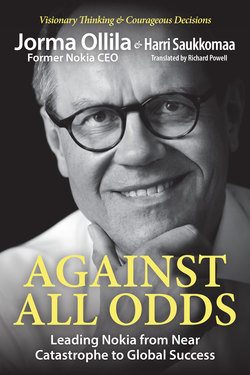Читать книгу Against All Odds - Jorma Ollila - Страница 17
На сайте Литреса книга снята с продажи.
ОглавлениеCHAPTER 5
International School
MY NEW SCHOOL COMPELLED EVEN ME, a shy country boy, to take a stand on the great issues facing the world. We had to defend our views every day in class, and once a week we had a debate on current events. There you had to be ready to put your arguments forward and give good reasons for them. I remember the heated discussions that events in 1967–68 provoked.
Czechoslovakia was one flashpoint. The Prague Spring in 1968 gave its people greater freedom to express their opinions and greater control over their own lives. In August a surge of Soviet tanks crushed the country’s embryonic democracy. There were a couple of boys from Czechoslovakia at Atlantic College, one of whom went on to Harvard. In the school debate we were divided into two camps: those who defended the occupation and those who opposed it. The division was of course artificial: I am sure that none of us really supported the trampling of democracy. But everyone was expected to have a view, and it made for an intense atmosphere.
For my first six months I was the same reserved and rather shy boy who had left Vaasa in Finland on his first foreign trip in order to spend two years here. But then my shyness disappeared and I began to be more assertive. Discipline at Atlantic College was not as strict as in ordinary British boarding schools. It says something of the spirit of the age and the prevailing open-mindedness that we didn’t have to wear school uniforms. Jeans were perfectly acceptable as long as they were clean, as was a clean shirt without a tie. For dinner we were expected to don a blazer, tie, and straight trousers.
Atlantic College tried its best to inure us to regular habits. The morning swim took place at a quarter past seven every day until November. The heavy British breakfast came only after that. The swimming season resumed somewhere around April. You certainly knew you were awake after that morning ritual. The school’s other recreations also toughened me up. My studies included life-saving, sculling, and other healthy activities. In my first few months I and another pupil built our own seaworthy boat out of rubber and wood. Apart from a little help from a carpenter the boat was entirely our own work. We also made our own wetsuits from rubber. When I lugged the heavy outfit back to Finland it really gave my brothers and sisters something to marvel at. There was however rather less use for it in Vaasa than on Wales’s stormy Atlantic coast.
I put a great deal of energy into my schoolwork. In addition to economics I was keen on physics, which was taught by Miss Adams. She was young and beautiful and I always took the seat in class where I could see her figure to best advantage. Despite my rather wandering attention I got top grades in physics, too.
One of the most important activities throughout my life has been tennis. I’m seen here at Atlantic College, South Wales, in the summer of 1968.
I also did some travelling. In the first Easter holidays I took the boat over to Ireland, from Fishguard to Rosslare. Ireland in those days was by no means the mainstream European country we know today. It wasn’t exactly a third-world country, but it didn’t feel like part of the first world, either. I took the train up the coast to Dublin and then hitchhiked to the little town of Strabane, which straddles the border between Northern Ireland and the Republic of Ireland. There I stayed for three days with the family of a boy I had met at a scout camp in Finland the previous year. They were a prosperous, middle-class family, but they were Catholics in Northern Ireland where Catholics were treated as second-class citizens. They spoke passionately of their desire to see a “Free Ireland.” I could sense from talking to them that something was not right in their lives. I was too polite or too tactful to probe them on the matter, though I knew nothing then of the ancient, almost tribal conflicts that divided Northern Ireland. About six months later the Troubles there ignited.
At Atlantic College I learned to live and work with people from different cultures, which wasn’t common for young Finnish men in the 1960s. There were of course opportunities to go abroad as an exchange student, to Britain or the United States, for example. But this didn’t guarantee exposure to the richness of many cultures as Atlantic College did. Finland was a monocultural country in the 1960s, or at least that’s how it felt in Ostrobothnia. The generation of corporate executives before mine never learned what real multiculturalism is. On the other hand, for generations younger than mine multiculturalism is one of the necessary conditions for work. Without a multicultural attitude one cannot work in an international company. Atlantic College helped me understand what real multiculturalism is, and why it’s essential in a globalized world.
